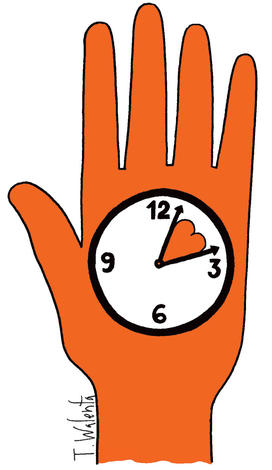From the moment they open their acceptance packets, Princeton students know how important volunteer service and civic engagement are to the school. Emblazoned on every letter and pamphlet is the University’s unofficial motto, “In the nation’s service and the service of all nations,” and the phrase is heard in countless speeches during freshman orientation. But when classes start, the vision of Princeton students serving the wider world often fades quickly, as academic stress sets in and personal pursuits take precedence over volunteer work for many.

Asked about the findings, some students said the issue is not that they feel volunteering is unimportant, but that it’s hard to devote time to it amid academic and extracurricular commitments. For example, Dean Rodan ’19 said he volunteered regularly during high school, but things changed when he came to Princeton.
“The culture is definitely more aimed toward educational pursuits,” Rodan said. “But we are all busy people, so it’s hard to blame the culture. More outreach to students — whether more posters, or more emails — might coax them out of the libraries and dorm rooms.”
For those who make service and community engagement a priority, some volunteer only during breaks and focus on academics when classes are in session. Community Action (CA) — a weeklong introduction to public service that is an alternative to Outdoor Action for incoming freshmen — and Breakout trips through the Pace Center for Civic Engagement expose students to the world beyond campus. These trips had a strong impact on Jarron McAllister ’16, who participated in Community Action and became a CA leader as a sophomore.
“On top of doing service and working with community partners, the mentorship aspect of CA was really what pushed me to apply [as a leader],” said McAllister, who also led a fall Breakout trip.
This academic year has seen stepped-up efforts to make service a part of everyday life at Princeton, and to connect with students who may not have had experiences like McAllister’s. The University’s strategic-planning document released last month (story, page 12) seeks to “emphasize and facilitate service in [Princeton’s] curricular, co-curricular, and extracurricular programs.”
Student leaders at the Pace Center led a door-knocking campaign during the fall term to let freshmen know about service opportunities, and the center promoted a “Month of Service” in January. Among other projects, participants prepared food for distribution to area residents coping with hunger and decorated brown paper bags for lunches provided through the Trenton Area Soup Kitchen. The men’s basketball team held a clinic for local children.
“The life of a Princeton student is hectic,” said Myesha Jemison ’18, who volunteers with Community House, which offers offers educational support to underrepresented youth in the Princeton area. “But my service at Community House is a priority, so I’ve made sure that it continues to be central to my Princeton experience.”











1 Response
Tom Mangus ’77, Dana Warren ’03
9 Years AgoAlumni Who Serve
Thank you to Matthew Silberman ’17 for his article exposing the challenges students at Princeton face finding time to volunteer (Student Dispatch, March 2). The board of directors of Princeton AlumniCorps would like to point out that many Princeton alumni in fact go on to live lives that make manifest our unofficial school motto, “in the nation’s service and the service of all nations.” We hope that President Eisgruber ’83’s task force on civic engagement will find ways to leverage the significant civic work already being done by many Princeton alumni so that undergraduates appreciate the importance of making time for such important endeavors.
When looking at alumni civic engagement, we at AlumniCorps have a front-row seat. The mission of Princeton AlumniCorps is to inspire and build civic leadership among alumni across generations by engaging them in significant activities that influence and improve our society. We now offer, in addition to our celebrated fellowship program: (1) a mid-career nonprofit leadership-training program, Emerging Leaders; and (2) the opportunity for experienced Princeton alumni to apply and expand their professional skills at selected organizations through ARC Innovators. In a recent study we conducted of our alumni base, a whopping 100 percent of respondents remain engaged in civic activities and 60 percent work in civic fields.
Princetonians are serving in the nation’s service and the service of all nations, and we are thrilled to know Princeton AlumniCorps is one of many available avenues. We look forward to continuing the dialogue and seeing their impact broadly celebrated in future PAW issues.